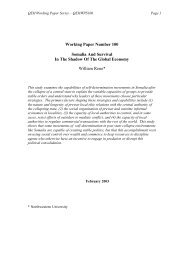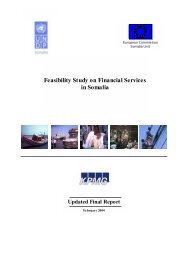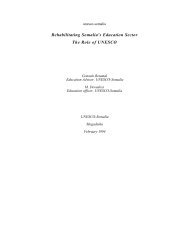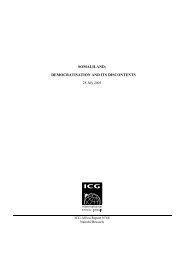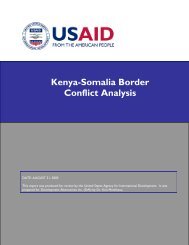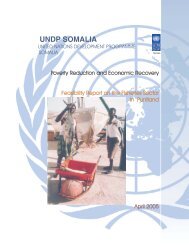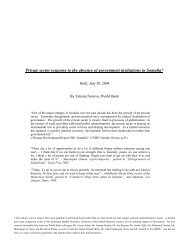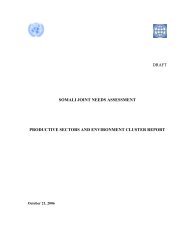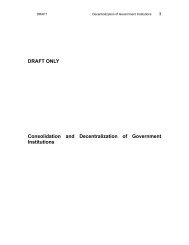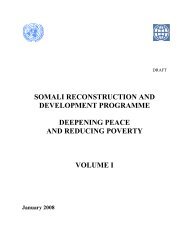Primary Education Survey Evaluation Report Somalia - Somali - JNA
Primary Education Survey Evaluation Report Somalia - Somali - JNA
Primary Education Survey Evaluation Report Somalia - Somali - JNA
Create successful ePaper yourself
Turn your PDF publications into a flip-book with our unique Google optimized e-Paper software.
PES <strong>Evaluation</strong> <strong>Report</strong>, 2008<br />
2 Training<br />
2.1 Findings and Analysis<br />
There have been a number of issues identified in this evaluation report that point to the importance of<br />
effective training of enumerators and supervisors, and to the consequences when training has not been<br />
undertaken with rigour and dedication. All of the issues discussed here have been mentioned in other<br />
sections of the report and are being readdressed for purposes of thoroughness and completeness. It is<br />
observed in the ownership section that ‘class training’ in itself is not an adequate preparation for the<br />
undertaking of complex skills. It is further emphasised that experience and ongoing support are also<br />
necessary. Thus, it is emphasised that there is a necessity for practical components, undertaken with<br />
appropriate guidance and opportunity to reflect on the experience, to be central to the training process.<br />
There are two major components to these discussions of training processes. The first is a certification<br />
process for enumerators and supervisors and the second is a set of additions to the current training<br />
programme that are based on experiences of people who have been engaged in the current process.<br />
Readers may react to some of these issues with the view that they are already included in the training<br />
process. What has become clear is that the training is not delivered using exactly the same process in all<br />
zones, consequently, some procedures are being emphasised for inclusion.<br />
<strong>Report</strong>s were received during the evaluation that some enumerators and supervisors did not take the<br />
training seriously. This is in spite of the recent initiative to develop a TOR for the employment of these<br />
staff members. The lack of commitment was reflected in behaviour of constantly absenting themselves<br />
from training sessions, constantly using mobile phones during training, and failing to take and active part<br />
in class sessions and activities. One MoE reported that:<br />
Some people are only here for the money. We need to be more careful in their selection.<br />
It is clear that it is not enough for mere attendance at the training be deemed adequate preparation, but<br />
also an evaluation of performance leading to a certification process should be embedded to ensure<br />
commitment and competence. A set of competencies should be designed and shared with trainees prior to<br />
the training workshop. Certification will only be granted when trainees achieve all competencies. The<br />
competencies might include:<br />
Trainees must:<br />
• Achieve satisfactory attendance<br />
• Be able to actively engage in class activities<br />
• Be able to use GPS and identification of way points<br />
• Be able to use mapping skills to plot Location coordinates<br />
• Demonstrate an ability to analyse data forms for inconsistencies<br />
• Be able to use audit trail instruments<br />
• Be able to discuss implications of inaccurate data<br />
• Demonstrate commitment to the project and understand its importance.<br />
• Be able to make ethical judgements appropriately<br />
To assist participants achieve these competencies it will be necessary to adjust course content to provide<br />
opportunities for participants to develop the necessary skills and attitudes. The following modules are<br />
suggestions derived from the study:<br />
• Ethics/Values module. This would have the aim of developing the importance of accurate data<br />
collection and to value the opportunity to be a participant in the process. This might be achieved<br />
through a set of small case studies that reflect common dilemmas faced in the field, and using<br />
class or group discussion to resolve the dilemmas. An issue that might be included here is how to<br />
deal with obviously exaggerated data, or major changes in data from previous years.<br />
• Field Testing and Modelling of Monitoring Process module.<br />
18



